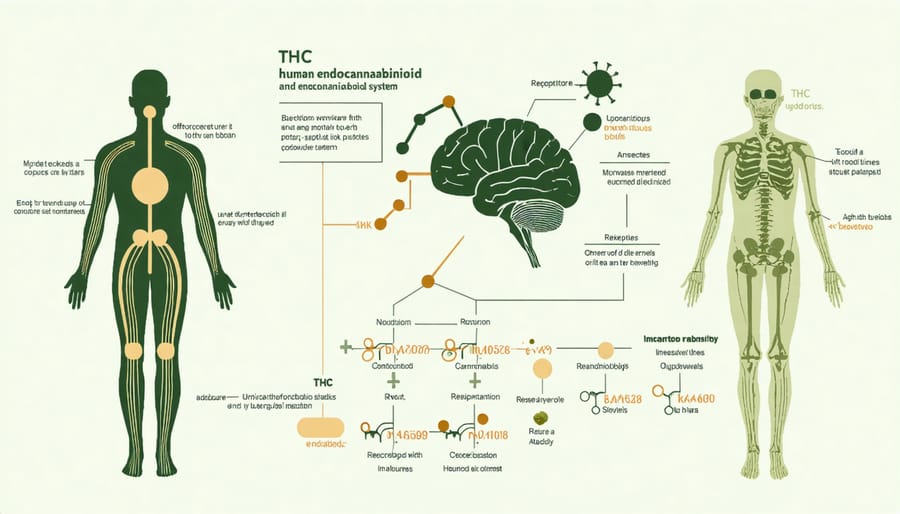Explore THC gummies as a potential way to alleviate Chronic Fatigue Syndrome symptoms by trying different formulations such as delta 8 gummies online to find what works best for you. Start with a low dose, gradually increasing it under professional supervision to minimize potential side effects. Monitor your symptoms closely, keeping a detailed log of your experiences to identify patterns or improvements. Always consult with your healthcare provider to tailor this approach to your specific needs and medical history, considering possible interactions with existing treatments.
Exploring Treatment Options for CFS

Conventional Treatments
For those living with Chronic Fatigue Syndrome (CFS), conventional treatments often focus on symptom management and improving quality of life. It’s important to remember that each person’s experience with CFS is unique, so these treatments may vary. Some common approaches include cognitive behavioral therapy (CBT), which helps shift negative thought patterns, and graded exercise therapy (GET), a structured approach to gradually increasing physical activity. Medications, such as antidepressants or sleep aids, might also be prescribed to address specific symptoms like pain, depression, or sleep disturbances. Additionally, lifestyle modifications play a significant role, with emphasis on stress management and establishing a routine. Exploring Effective coping strategies tailored to individual needs can also be beneficial. While these treatments offer potential relief, it’s essential for individuals and their healthcare providers to work closely together to find the most suitable options.
Alternative and Emerging Therapies
Exploring alternative therapies for Chronic Fatigue Syndrome (CFS) offers hope to many seeking relief. Aside from standard treatments, holistic approaches can make a difference. Emphasizing a balanced diet rich in nutrients can fuel energy levels, while lifestyle changes like regular, gentle exercise and stress-reduction techniques such as yoga and meditation can enhance overall well-being. Recently, THC gummies have emerged as a novel option some individuals find beneficial. These gummies are believed to help manage certain CFS symptoms by promoting relaxation and aiding sleep. Personal stories from the CFS community often highlight these gummies as a part of a more comprehensive management plan. However, it’s essential to weigh these new treatments’ potential benefits against any possible side effects and consult with healthcare providers to tailor a solution that works best for individual needs.
Understanding THC and Its Effects
What is THC?
Tetrahydrocannabinol, or THC, is the main psychoactive compound found in cannabis plants. It’s known for creating the sensation of being “high,” but it also holds potential for therapeutic uses. For those struggling with Chronic Fatigue Syndrome (CFS), THC’s relaxing properties could offer relief. However, the legal status of THC varies worldwide. In some regions, it’s available for medical or recreational use, while in others, it’s strictly controlled. As you consider THC gummies for CFS, it’s important to understand both the potential benefits and the legal considerations in your area. Always seek guidance from healthcare professionals.

THC’s Interaction with the Body
THC, or tetrahydrocannabinol, is a compound found in cannabis plants that interacts with the body’s endocannabinoid system (ECS). The ECS is a complex network of receptors throughout our body that helps regulate various functions like mood, appetite, sleep, and pain perception—essential areas often affected in individuals with Chronic Fatigue Syndrome (CFS).
When THC is consumed, such as through gummies, it can bind to these receptors and potentially influence these processes. For some people with CFS, this interaction might help alleviate symptoms like persistent fatigue and discomfort. The calming and uplifting effects of THC could offer a sense of relief, helping manage the overwhelming exhaustion and perhaps improving mood, making daily activities more approachable.
However, it’s essential to weigh these potential benefits against possible side effects. THC can affect each person differently, and some might experience side effects like dizziness, dry mouth, or changes in appetite. It’s also possible to feel anxious or have mood changes, which could exacerbate certain aspects of CFS for some.
Given these varied effects, it is crucial for individuals with CFS and their caregivers to approach THC use thoughtfully. Discussing this option with a healthcare professional can provide guidance tailored to individual needs, offering a safe path to explore whether THC gummies might fit into their management strategy for CFS relief.
The Potential of THC Gummies for CFS Relief
Ease of Use and Accessibility
Gummies have become a popular choice for those considering THC as a complementary option for managing chronic fatigue symptoms. One of the main reasons is their ease of use. Unlike other methods that might require precise measurements, THC gummies come with a predetermined dosage, allowing individuals to know exactly how much they’re consuming. This can be particularly reassuring for anyone concerned about getting the dosage right, minimizing the trial and error often associated with new treatments.
Moreover, gummies are incredibly portable and discreet, making them a convenient option for those on the go. Whether you’re going through a busy day or need relief while outside of your home, these small, easy-to-carry treats can be taken without much fuss or attracting unwanted attention. This can be a significant advantage for those managing CFS, as the added stress of finding privacy to medicate can be averted. Additionally, it’s worth noting that many people find the flavors of gummies more palatable than other forms of THC, which can enhance the overall experience and ensure consistent use when needed.

Personal Stories and Testimonials
Sam, a 32-year-old living with Chronic Fatigue Syndrome (CFS), shares how THC gummies have brought a sense of relief he hadn’t found with other treatments. “I was skeptical at first,” Sam explains, “but after trying THC gummies, my energy levels stabilized, and I finally experienced a reduction in my fatigue.” For Sam, these gummies provided a gentle yet noticeable difference in managing his daily activities.
Similarly, Karen, a dedicated teacher who also battles CFS, found solace in THC gummies after years of struggling to maintain her work-life balance. She recalls, “The gummies helped me feel more present during my day. It wasn’t a cure-all, but it certainly made life a bit more manageable.”
These personal stories highlight the potential of THC gummies as part of a holistic approach to managing CFS. While not a universal solution, for Sam and Karen, they brought much-needed relief, improving their quality of life.
Scientific Insights and Research
Research on THC’s effects on chronic fatigue is still in its infancy. While some studies hint at THC’s potential to alleviate fatigue by influencing the body’s endocannabinoid system, much more exploration is necessary. These initial findings spark hope for CFS patients seeking alternative treatments, as they suggest that THC gummies might help manage symptoms. However, it’s crucial to approach these results with cautious optimism; individual responses can vary greatly, and what’s effective for one person may not help another. Ongoing research is essential to fully understand THC’s impact on energy levels and its role in comprehensive CFS management strategies.
Considering the Risks and Ethical Concerns
Potential Side Effects
When considering THC gummies for chronic fatigue relief, individuals should be aware of potential side effects and discuss these with their healthcare provider. Common side effects may include dizziness, dry mouth, or feelings of anxiety. In some cases, individuals might experience changes in appetite or mood. It’s important to recognize that the response to THC can vary significantly from person to person, so a lower dose might be advisable initially to assess personal tolerance. Since chronic fatigue syndrome symptoms can be unpredictable, any new treatment should be approached cautiously. Additionally, operating machinery or driving should be avoided until you understand how THC affects you.
Legal and Ethical Implications
Navigating the legal landscape of THC products can be tricky, particularly for those seeking relief from chronic fatigue syndrome (CFS). THC, the psychoactive component in cannabis, is federally illegal in many places, although some regions have legalized it for medical or recreational use. It’s crucial to consult local laws before considering THC gummies as an option. Ethically, healthcare professionals should carefully weigh the potential benefits against the risks and uncertainties. Recommending THC should involve a thorough discussion of its effects and side-effects, ensuring patients feel informed and supported in their healthcare choices. Personal experiences may highlight varied responses, underlining the importance of individualized care.
Consulting Healthcare Professionals
When considering THC gummies as a means to alleviate Chronic Fatigue Syndrome (CFS) symptoms, it’s crucial to engage with your healthcare provider. Every individual experiences CFS differently, and what works for one person might not be suitable for another. Engaging with a knowledgeable healthcare professional can help you better understand the potential benefits and risks of incorporating THC into your treatment plan. They can provide personalized advice based on your medical history and current health status.
Discussing this option with a doctor ensures your approach to CFS management is safe and informed. They may also suggest other complementary therapies or adjustments to your current regimen that can be beneficial. It’s important to note that while THC gummies offer a potential alternative, they may interact with other medications or have side effects, which further underscores the importance of professional guidance.
Ultimately, open communication with your healthcare team forms the foundation of effective CFS management, ensuring that you are making choices that support your overall well-being.
Conclusion
Exploring THC gummies as a potential aid for chronic fatigue relief opens a gateway to hope for those living with Chronic Fatigue Syndrome (CFS) and their supporters. Throughout this article, we examined the intersection of personal experiences and scientific insights, shedding light on how THC could influence CFS symptoms. While some have found relief, it’s critical to approach this treatment choice with thorough consideration, weighing potential benefits against side effects. Each individual’s journey with CFS is personal and unique, and what works for one may not be ideal for another. Before integrating THC gummies into your care plan, consult with healthcare professionals to ensure it aligns with your needs and circumstances.






